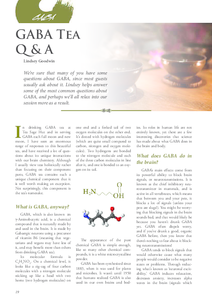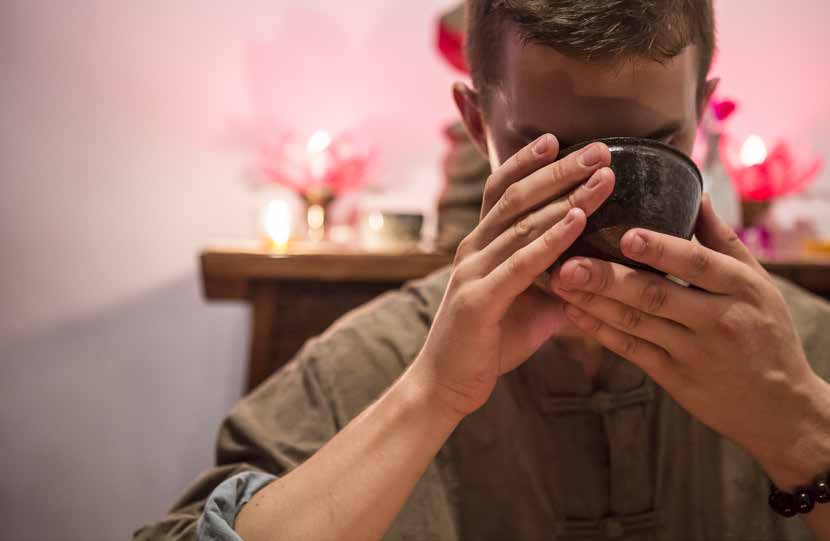
 |
|

In drinking GABA tea at Tea Sage Hut and in serving GABA each full moon and new moon, I have seen an enormous range of responses to this beautiful tea, and have received a lot of questions about its unique interactions with our brain chemistry. Although I usually view teas holistically rather than focusing on their component parts, GABA tea contains such a unique chemical component that it is well worth making an exception. Not surprisingly, this component is the tea's namesake.
GABA, which is also known as γ-Aminobutyric acid, is a chemical compound that is naturally made by and used in the brain. It is made by Gabaergic neurons using a precursor of vitamin B6 (meaning that vegetarians and vegans may have less of it, and may benefit more than others from drinking GABA tea).


Its molecular formula is C4H9NO2. On a chemical level, it looks like a zig-zag of four carbon molecules with a nitrogen molecule sticking up like a head with two horns (two hydrogen molecules) on one end and a forked tail of two oxygen molecules on the other end. It's dotted with hydrogen molecules (which are quite small compared to carbon, nitrogen and oxygen molecules). Two hydrogens are bonded to the nitrogen molecule and each of the three carbon molecules in line after it, and one is bonded to an oxygen on its tail.
The appearance of the pure chemical GABA is simple enough, like so many other chemical compounds, it is a white microcrystalline powder.
GABA has been synthesized since 1883, when it was used for plants and microbes. It wasn't until 1950 that humans realized GABA is also used in our own brains and bodies. Its roles in human life are not entirely known, yet there are a few interesting discoveries that science has made about what GABA does in the brain and body.
GABA's main effects come from its powerful ability to block brain signals, or neurotransmissions. It is known as the chief inhibitory neurotransmitter in mammals, and is active in all vertebrates, which means that between you and your pets, it blocks a lot of signals (unless your pets are slugs!). You might be worrying that blocking signals in the brain sounds bad, and that would likely be because you haven't drunk GABA yet. GABA often dispels worry, and if you've drunk a good, organic GABA before, then you know that there's nothing to fear about it blocking neurotransmissions!
GABA tends to block signals that would otherwise cause what many people would consider to be negative states or problems. Through reducing what's known as 'neuronal excitability,' GABA induces relaxation, decreases anxiety, increases alpha waves in the brain (signals which also increase during meditation) and improves your overall mood.
In some studies and in the experience of myself and others who have drunk GABA with the Global Tea Hut community, GABA's benefits include relieving pain, reducing symptoms of PMS, stabilizing blood pressure, burning fat and treating ADHD.
GABA is also widely recognized as being directly responsible for the regulation of muscle tone (meaning that it promotes lean muscle growth), and there is some scientific speculation that GABA could enhance immunity under stress.
There is a lack of clarity in the scientific community about whether GABA can cross the blood-brain barrier in significant levels, and whether or not taking GABA orally can impact the brain. Are GABA's benefits all in our heads (and unreachable by tea)? Some scientists say so. Whether the benefits of taking or drinking GABA come from its direct interactions with the body outside the brain (which may be the case, as a study with rats showed that GABA-reactive systems included areas of digestion, reproduction and more) or from interactions in the brain itself, the results are often clear to those who drink it.

As I mentioned before, the chemical compound known as GABA increases the alpha-waves in the brain. This is a portion of what happens in the brain during meditation, and some people find that GABA can be very beneficial not only to relaxation and a restful sleep, but also to meditation practice or inducing a meditative state of mind.
In tea sessions, I've also seen emotional effects such as increased joy, gratitude, a feeling of safety, a better ability to cope with and process emotional pain and/or a clearer perception of one's path.
In some studies with mice, GABA has been shown to have different effects for developing and developed brains. In developed brains, it often induces the results I've outlined above. However, in developing brains, it may cause a more excited state. This means that it may cause a more excited set of emotions and feelings as well. There is no firm conclusion on this from the scientific world. Instead of relying on shaky science, we recommend either avoiding GABA with kids or (if your instincts tell you it's a good idea) trying a very small amount of GABA with your child on an evening when an early bedtime is not essential and seeing what happens.
